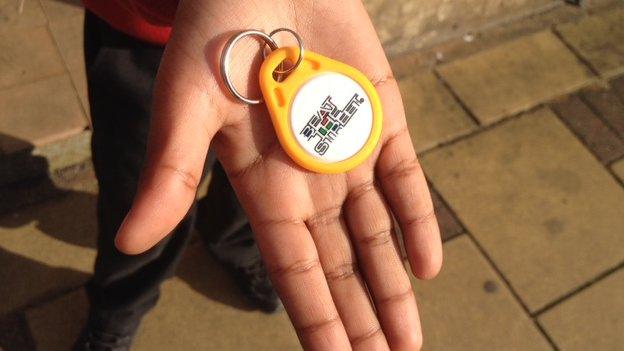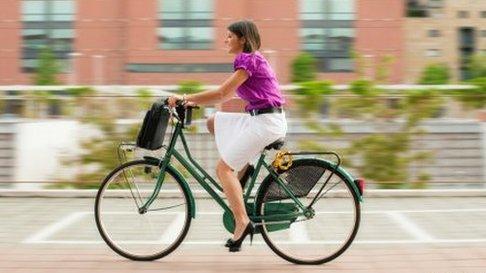Experts call for new focus on physical activity
- Published
We are aware that this interactive video may not work on some older browsers. You can find a non-interactive version of the content below.
This interactive video may not work on some older browsers, on iOS or Android mobile devices, or Android tablets.
Experts say official guidelines on physical activity are being "ignored", creating a major public health challenge.
Official figures show many people are failing to meet the recommended level of two and a half hours of moderate activity each week.
They say just small improvements in overall activity levels would produce enormous benefits.
Many initiatives to promote activity fail to reach the wider population, but a community-based scheme called "Beat the Street" is showing some promising results.
I spend a lot of time reporting on the damaging impact of problems such as obesity, smoking and excessive drinking. By comparison the threat posed by inactivity gets a lot less airtime - even though it causes millions of deaths from cancer, heart disease, diabetes around the world, and the situation is getting worse.
Global guidelines - adopted here in the UK - recommend two and a half hours of moderate activity a week for adults - things like cycling or brisk walking. They also call for a couple of sessions of "muscle-strengthening activity", which could include heavy gardening or yoga.
Missing the mark
Official figures suggest about a quarter of men and half of women are missing the mark. But trials monitoring movement suggest the true picture is much worse - with only about one in fifteen men and fewer than one in thirty women - meeting the target.
Dr Mike Loosemore, a leading sport medicine consultant based at University College Hospital in London, says the NHS is "ignoring" guidelines to promote physical activity, set out by the official advisory body NICE.
"We have huge anti-smoking programmes. We have massive amounts of money being spent on obesity, and GPs are paid to check peoples diabetes and cholesterol status. We know that inactivity is a bigger health problem than all those things."
He says small improvements in activity could deliver huge health benefits.
"If we could get the population more active we could reduce the risk of bowel cancer by 60%. We could reduce the risk of diabetes by 50%. We could reduce the risk of breast cancer by 50%, reduce mild to moderate depression by the same as taking Prozac. we could improve bone health, reduce falls in the elderly, reduce Alzheimer's by 30%."
"Keep moving"
His concerns are shared by Dr William Bird, a GP and public health expert.

He says: "People go to their offices, they drive there, they go on the escalator, they sit doing their emails in their work, they come home again, and then they just watch television. All that time they're causing damage to their bodies, so we just have to keep moving."
Dr Bird has set up "Beat the Street", a community-based competition to encourage activity. The scheme is based mainly in primary schools but also encourages participation from GP practices and local clubs and businesses.
Everyone is issued with a fob which registers on sensors - or "beat-boxes" - sited at strategic points around the neighbourhood. The higher the tally of "swipes" at different beat boxes, the more points you win, and these are converted into prizes for nominated charities.
Ivybridge primary school in Hounslow in west London has signed up for Beat the Street. The assistant head teacher is Sophie Tomlin.
"We've had a real issue with parents not walking to school but taking the car and driving right up to the school gates - and children and families having to dodge them. This is for a journey of one or two minutes so by the time you've got the children in the car and started it you could have walked to school."
New routine
A mother at Ivybridge, Nimo Ali, told me the scheme had changed her routine.
"I'm quite a busy person so the weekends are mostly indoors, and i think this has given me a different way of looking at life. I might be coming out more, so I'm more of an active woman now, walking around rather than just sitting in front of the TV!"
After school children and their families were crowding around the nearest beat box to swipe their fobs.
"I like going around the estate and watching for beat-boxes", said one girl. "I can scan it and i know I'm getting points!
I asked one of the boys how much extra people were doing as a result of beat the street. He answered with great authority and precision, "At the moment 54%".
Dr Bird says 10% more people meet the activity guidelines after Beat the Street, and 22% go from doing virtually nothing to doing a lot more.
This is just one of many initiatives up and down the UK to address the challenge of inactivity. The hope is it will mobilise a competitive spirit between neighbourhoods, towns and cities to score points, win prizes and have fun - with the added benefit of getting people on the move.
- Published20 June 2014

- Published14 September 2014
